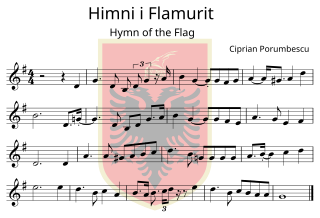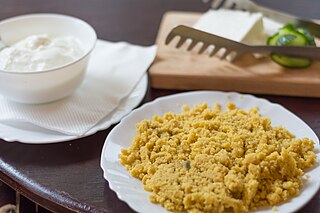Related Research Articles

Albania, officially the Republic of Albania, is a country in Southeast Europe on the Adriatic and Ionian Sea within the Mediterranean Sea. It shares land borders with Montenegro to the northwest, Kosovo to the northeast, North Macedonia to the east, Greece to the south and maritime borders with Greece, Montenegro and Italy to the west.

The Albanians are an ethnic group native to the Balkan Peninsula and are identified by a common Albanian ancestry, culture, history and language. They primarily live in Albania, Kosovo, North Macedonia, Montenegro, Serbia as well as in Croatia, Greece and Italy. They also constitute a diaspora with several communities established in the Americas, Europe and Oceania.

Eastern Europe is the eastern part of the European continent. There is no consistent definition of the precise area it covers, partly because the term has a wide range of geopolitical, geographical, cultural, and socioeconomic connotations. There are "almost as many definitions of Eastern Europe as there are scholars of the region". A related United Nations paper adds that "every assessment of spatial identities is essentially a social and cultural construct". One definition describes Eastern Europe as a cultural entity: the region lying in Europe with the main characteristics consisting of Greek, Byzantine, Eastern Orthodox, Russian, and some Ottoman cultural influences. Another definition was created during the Cold War and used more or less synonymously with the term Eastern Bloc. A similar definition names the formerly communist European states outside the Soviet Union as Eastern Europe. Most historians and social scientists view such definitions as outdated or relegated, but they are still sometimes used for statistical purposes.

"Himni i Flamurit" is the national anthem of Albania. Its music was adapted from an original composition by the Romanian composer Ciprian Porumbescu, for the song "Pe-al nostru steag e scris Unire". The words were written by the Albanian poet Asdreni, and are close to the original Romanian lyrics which Andrei Bârseanu wrote for Porumbescu's piece.
The Albanian cuisine is a representative of the cuisine of the Mediterranean. It is also an example of the Mediterranean diet based on the importance of olive oil, fruits, vegetables and fish. The cooking traditions of the Albanian people are diverse in consequence of the environmental factors that are more importantly suitable for the cultivation of nearly all kinds of herbs, vegetables and fruits. Olive oil is the most ancient and commonly used vegetable fat in Albanian cooking, produced since antiquity throughout the country particularly along the coasts.

Southeast Europe or Southeastern Europe (SEE) is a geographical region of Europe, consisting primarily of the coterminous Balkan Peninsula. There are overlapping and conflicting definitions as to where exactly Southeastern Europe begins or ends or how it relates to other regions of the continent. Sovereign states and territories that are included in the region are, in alphabetical order: Albania, Bosnia and Herzegovina, Bulgaria, Croatia, Greece, Kosovo, Montenegro, North Macedonia, Romania, Serbia, and East Thrace. Sometimes, Moldova and Slovenia are also included. The largest city of the region is Istanbul, followed by Bucharest, Sofia, Belgrade, and Athens.

The Party of Labour of Albania (PLA), sometimes referred to as the Albanian Workers' Party (AWP), was the vanguard party of Albania during the communist period (1945–1991) as well as the only legal political party. It was founded on November 8, 1941, as the Communist Party of Albania, but its name was changed in 1948. In 1991, the party was succeeded by the Socialist Party of Albania. For most of its existence, the party was dominated by its First Secretary, Enver Hoxha, who was also the de facto leader of Albania.

The Albania national football team is the men's football team that has represented Albania in international competition since 1946 and is controlled by the Albanian Football Association which is headquartered in the city of Tirana. The team is affiliated with UEFA and competes in the three major professional tournaments, the FIFA World Cup, UEFA European Championship and the UEFA Nations League. Albania was the winner of the 1946 Balkan Cup and the 2000 Malta Rothmans International Tournament. At Euro 2016, Albania made its debut at a major men's football tournament after 50 years. After its completion in 2019, Air Albania Stadium, also known as Arena Kombëtare will be the home ground of the national team. Albania's highest FIFA World Ranking was 22nd in August 2015.

A tres leches cake is a sponge cake—in some recipes, a butter cake—soaked in three kinds of milk: evaporated milk, condensed milk, and heavy cream.

Gheg Albanian is one of the two major varieties of Albanian. The other is Tosk on which Standard Albanian is based. The geographic dividing line between the two varieties is the Shkumbin River, which winds its way through central Albania. Gheg is spoken in Northern Albania, Kosovo, northwestern Republic of North Macedonia, southeastern Montenegro and southern Serbia, by the ethnic group known as Ghegs.

Kačamak, also known as pura, is a kind of maize porridge made in the Balkans. Its name is derived from the Turkish word kaçamak, meaning escapade. It is also known as bakrdan (бакрдан) in North Macedonia.

The Polytechnic University of Tirana (UPT) is a public university located in Tirana, the capital of Albania. It offers degrees in engineering and related fields.
Vithkuqi script, also called Büthakukye or Beitha Kukju after the appellation applied to it by German Albanologist Johann Georg von Hahn, was an alphabetic script invented for writing the Albanian language between 1825 and 1845 by Albanian scholar Naum Veqilharxhi. Though the script is sometimes erroneously claimed to be named after its inventor, as in Carl Faulmann's Das Buch der Schrift, the alphabet's name is derived from Vithkuq, a village in the Korçë region where Veqilharxhi was born. Vithkuqi script was specifically designed to be as religiously neutral as possible, avoiding the duplication of Greek, Latin, or Arabic characters. It had a near-perfect correspondence between letters and phonemes, but lacked characters for modern Albanian "gj", "rr", "xh", and "zh". The script never took hold because of its inventor's premature death and because of the prohibitive costs of cutting new type for the invented characters; nevertheless, a number of documents using the script were published in the late 19th century. The script was eventually overwhelmed by the Greek, Arabic and Latin scripts it had been designed to supplant, the latter becoming the official one in 1909.
Albanian folk beliefs comprise the beliefs expressed in the customs, rituals, myths, legends and tales of the Albanian people. The elements of Albanian mythology are of Paleo-Balkanic origin and almost all of them are pagan.

Municipalities are the second-level administrative divisions of Albania. Prior to 2015, there were two types of municipalities in Albania: municipalities with an urban character called bashki, and municipalities with a rural character called komunë (commune). Municipalities are all divided into at least two "administrative units", which are sometimes referred to as "municipal units" or "units of local governance". Administrative units are composed of one or more cities, villages, or neighbourhoods and constitute the third- and final-level administrative divisions of Albania.

Kejsi Tola is an Albanian pop and RnB singer. She is known for her originality and unique high vocals. She was the winner of "Ethet". In May 2009 she represented Albania in the Eurovision Song Contest 2009 in Moscow, Russia with "Carry Me in Your Dreams".

A xhamadan or xhamadani is a traditional wool garment, which is worn by Albanian men. It can be sleeved or sleeveless. The sleeveless xhamadan is only one type of the Albanian vest, the other two being the xhamadani me reshme, and the xhamadani fermele. The xhamadani me reshme went out of use around the beginning of the 20th century. whereas the xhamadan and the xhamadani fermele continue to be used in traditional festivities. A good xhamadan is usually richly embroidered, sometimes in gold: in the past its quality revealed social rank.

India-Albania relations are the bilateral ties between the Republic of India and the Republic of Albania. Bilateral relations between India and Albania are cordial and friendly.
The crossed hands gesture is a hand signal that denotes Albania in International Sign. Known as duart e kryqëzuara in Albanian, it is sometimes referred to as the "eagle gesture" and is a symbol used by ethnic Albanians in Albania, Kosovo, North Macedonia, and other regions of the world where Albanians live. It is meant to visually illustrate the double-headed eagle, the main image on the Albanian flag. The symbolism of the double-headed eagle among Albanians encapsulates their ethnicity and flag, viewing it as a symbol that represents ethnic-Albanian people across the globe.
References
| This Albania-related article is a stub. You can help Wikipedia by expanding it. |
| This article relating to a European folklore is a stub. You can help Wikipedia by expanding it. |